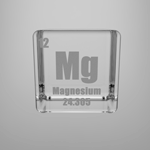 How do you know if you’re magnesium deficient?
How do you know if you’re magnesium deficient?
Simple. Have a look at the magnesium deficiency symptoms below and see how many of them relate to you. Nearly the whole of the population is thought to be magnesium deficient to some degree.
- Lacking in energy and always tired
- ADHD
- ADD
- Seizures
- Epilepsy
- Back pain or painful muscle spasms
- Brain Fog
- Fibromayalgia – Credit: Mikael Häggström
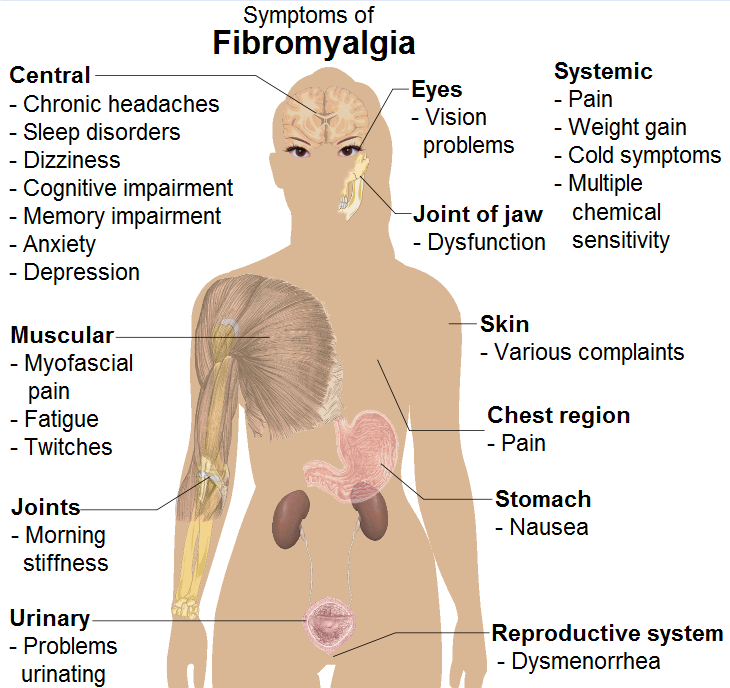
- Migraines
- Insomnia
- Osteoporosis
- Kidney Stones Credit: Blausen Gallery 2014
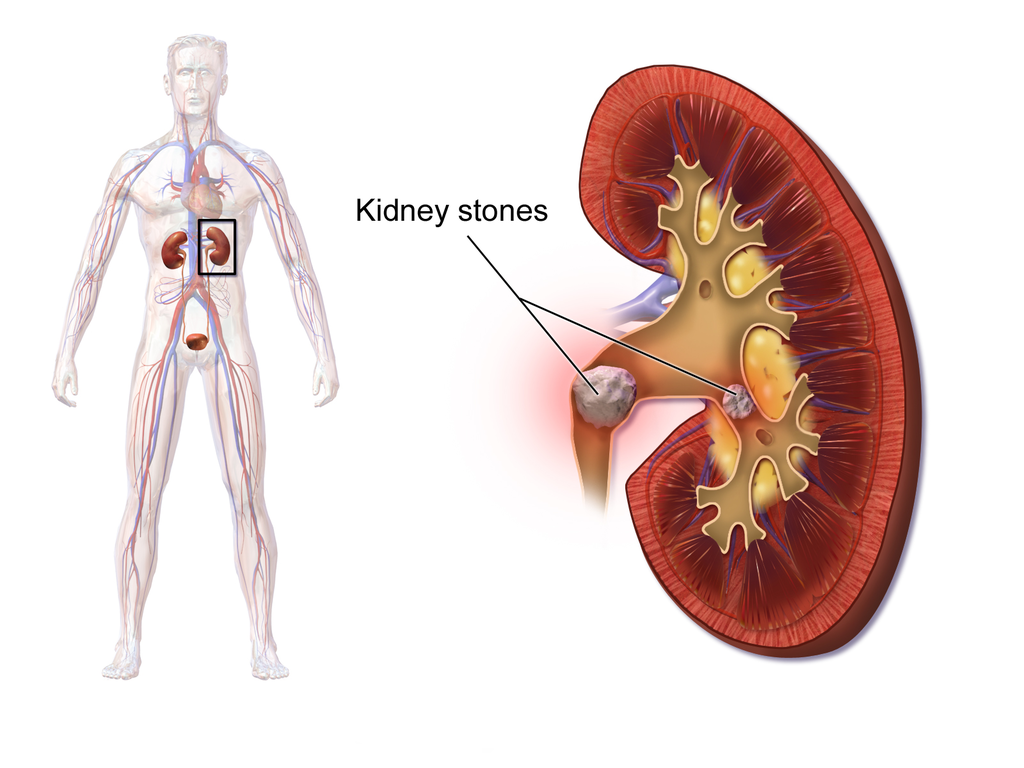
- Cramp
- Muscle Weakness
- Twitches, particularly around the eyes
- Vertigo
- Constipation
- Gallbladder Disease
- Irritable Bowel Syndrome
- GERD
- Gum Disease
- Anxiety
- Glaucoma
- Neck pain and cramps
- Restless Leg Syndrome
- Angina – Credit: Blausen Gallery 2014
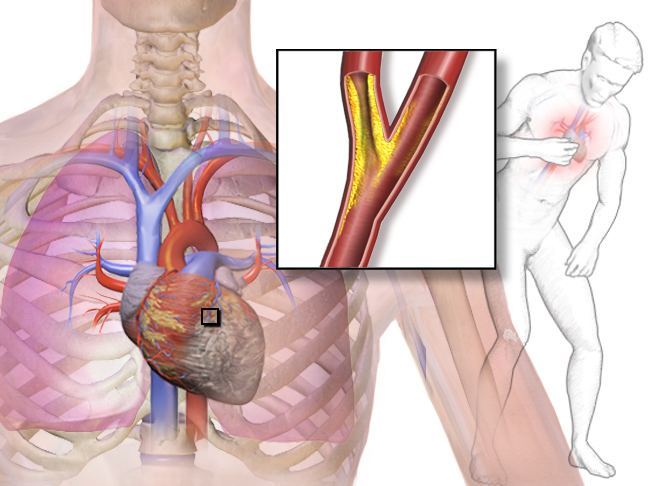
- Blood Pressure (Hypertension)
- Asthma
- Diabetes
- Heart Arrhythmia
- Palpitations
- Depression
- Cystitis
- Raynaud’s Syndrome
- Adrenal Fatigue
But the most serious problem…
The list is extensive with the above just being a few, but the most serious of problems that could be eleviated with magnesium supplementation is the biggest killer in the world Ischaemic heart disease or coronary heart disease (CHD). It is responsible for more than 73,000 deaths in the UK per year and in the USA 610,000 deaths each year are caused by CHD which is 1 in every 4 deaths. CHD is the scourge of the masses and many of these deaths could have been avoided if just one nutrient was not depleted in the body and constantly monitored. Credit: Coronary Arterial Plaque. Blausen Gallery 2014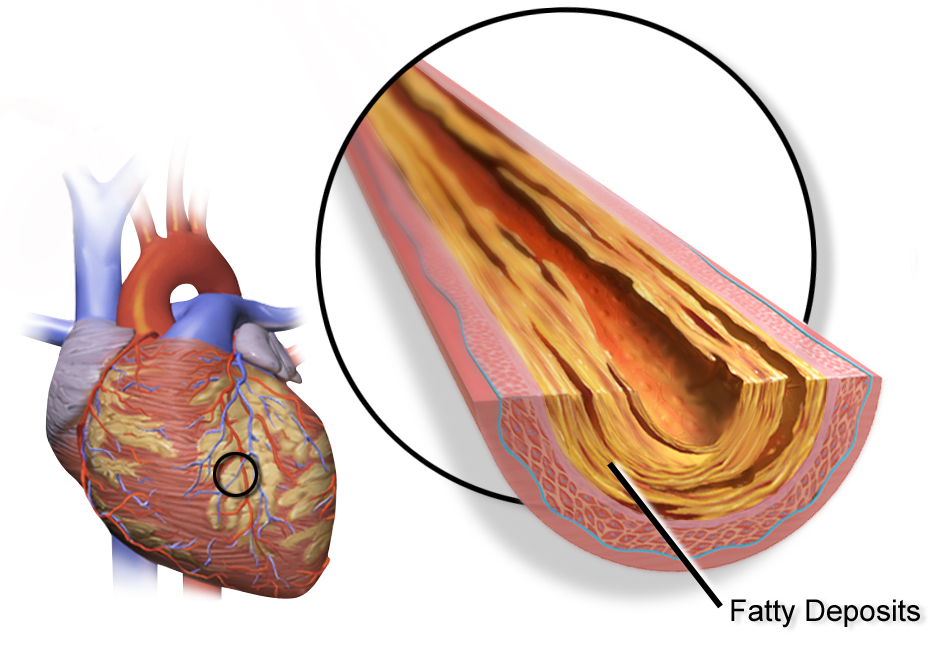
Dr Carolyn Dean wrote in her book ‘The Magnesium Miracle’ “Calcium can precipitate out of the blood and deposit in the lining of arteries, causing hardening of the arteries (arteriosclerosis). It can coat and stiffen cholesterol deposits (plaque) in the arteries leading to atherosclerosis. This, in turn, can cause blood pressure to rise as well as increase the risk of heart attack and stroke. Calcium can even deposit in the brain. Many researchers are investigating it as a possible cause of dementia, Alzheimer’s and Parkinson’s disease”.
The Last Post…
Take a look at my post below, about the problems with Calcium if Magnesium is not present in enough quantities to control it.
Finally
I would be most surprised if you did not have at least one or two of the above symptoms. Even so, despite the fact you may be as fit as a fiddle, please make sure your Mg is at optimum levels. The 300mg – 400mg is a minimal to aim for and don’t forget to take into  account your weight and the Mg in your food. A slender 5ft tall woman will need less than a 6ft plus heavy built man. I am a 160 lb woman, an inch or two short of 6ft and I make sure I get at least 600mg of magnesium per day including what’s in my daily food. IMHO Mg Chloride is by far the best supplement as it is completely bio-available.
account your weight and the Mg in your food. A slender 5ft tall woman will need less than a 6ft plus heavy built man. I am a 160 lb woman, an inch or two short of 6ft and I make sure I get at least 600mg of magnesium per day including what’s in my daily food. IMHO Mg Chloride is by far the best supplement as it is completely bio-available.
Spread the word!

Hey buddy, being grateful as you posted such a useful and informative post. These gonna help others for sure. I would like to save it. Thanks a lot for sharing your great thoughts. Keep posting, looking forward to more from you
Thanks for your comment ‘omy9’. Be my guest and save it and share it around so as many people as possible can know the truth about Magnesium. It is absolutely vital, no matter if you are a healthy individual or have health problems. Being replete in Mg will definitely help all conditions and diseases. Just make sure you take a good quality Mg supplement (not Mg Oxide). Mg Citrate in powder form is good for getting a dose that suits you and it is a gentle laxative if you have digestive problems. Mg Chloride is the best option. ReMag is a high quality product but is quite expensive. You could try doing your own, check out the link!
Hi,
Great article.
So how do you check your magnesium level? Do you have to have lab work done? Should this be done before starting taking the extra magnesium tablets?
I see the importance of this and had some of the symptoms this summer. If you do have a lack of magnesium can the symptoms be on and off or will they be pretty consistent?
Thanks for a great article,
Vicky
Hi Vicky, If you want your mg level checked you will need a mg test done. Trouble is the test mostly used for mg is a serum test which is actually very unreliable and antiquated. The test to have is a red blood cell (RBC) magnesium test which will give a much more accurate result. Studies show that as red blood cells are 500 times more abundant in blood than white blood cells, blood cell magnesium gives a more accurate result than a serum test.
The thing is, most of us will be deficient because mg is just not in our food as it used to be, mainly because its not in our soil which has been depleted due to agricultural practices like fertilisers and pesticides. As well as this, we are under great stress in this modern day and stress is the biggest depleter of mg. Be assured that mg is completely safe to take and if you take too much, which is highly unlikely, it will be excreted. Depending on your weight, you need at least 300mg – 400mg of mg per day, it’s as important as water to our wellbeing. I am a couple of inches off 6ft and weigh 160lbs and I take on average and depending on what food I eat, about 500mg per day. 300mg of mg chloride (the best IMHO) and 200mg of mg citrate. Citrate is good for digestive problems like IBS/constipation. If you do nothing about your mg it will get worse as you get older. It is difficult to get enough in our foods now, so supplementation is the way forward. It will certainly alleviate any symptoms you have. If you want further details, look around this site, it’s a work in progress but there’s already a lot of information here. Keep healthy, Ches
One symptom I’ve been told by a naturopath as well is ‘tongue quiver’. I suppose it’s probably covered under the “twitches” symptom, but I found it to be a quick and easy test!
Basically you just poke your tongue out at yourself in a mirror – in some people with magnesium deficiency apparently it does a bit of an involuntary twitch or quiver, or so I’ve been told!
Hi Jolie and thanks for reading the post. That sounds very feasible doesn’t it. I don’t ever remember getting tongue tremble or quiver when I was very deficient but I did suffer greatly with eye twitches and continual movement around my eyes. I will mention it in the website, thanks for the info. Good health to you. Ches
This is a very informative post. Most of the time I hear that diet is sufficient enough to get all the nutrients we need. However, I do wonder how much of that is true. I have never considered a magnesium deficiency but when there are so many symptoms that can be present all the time, you do have to wonder if taking some kind of additional vitamin wouldn’t be helpful.
Hi Jessica and thanks for reading the post. I’m sure you’ll find that if you take a magnesium supplement you’ll feel more energy, sleep better and lots of those niggling aches and pains we all get, will disappear. Don’t buy the magnesium oxide, it is the cheapest but only 4% of it will actually be used by the body, the rest will be excreted, good if you need a laxative. The two best supplements IMHO are mg citrate and mg chloride. Citrate can be bought in powder form which gives you great control over how much you take and chloride can be used topically as well as internally. Mg chloride doesn’t taste great, so needs to be taken in water with a little cordial. Keep healthy, Ches
hi Ches
what an interesting post on magnesium deficiency symptoms. I knew little about it before but now see that a lot of symptoms are indeed common ones. About a year ago I got tested for everything, just a full on blood work to see what my health was. And I was happy to hear that everything was within the normal limits. But I do take magnesium supplements. Thanks for including the pictures as well, they were helpful.
Hi Emily and thanks for reading the post. I wonder what sort of test you had a year ago. Trouble is the test mostly used for mg is a serum test which is actually not at all accurate. The test to have is a red blood cell (RBC) magnesium test which will give a much more accurate result. Studies show that as red blood cells are 500 times more abundant in blood than white blood cells, blood cell magnesium gives a more accurate result than a serum test. Also make sure your supplement isn’t mg oxide, it is the cheapest but only 4% will ever get into the body, the rest will be excreted. Mg citrate (which is laxative) or Mg chloride which is the best in my opinion and can be used topically as well as orally. Good health to you. Ches
Great article. It’s amazing how being deficient in Magnesium can cause such a havoc in the human body. I personally suffer from Fibromyalgia and quite frankly I will be picking up some magnesium supplements to see if it will help. Thanks for sharing this information. It is very helpful, specially for people like me that are suffering from a multitude of health issues and are trying to get to the root of the problem and fix it naturally instead of taking tons of medicine that usually cause other issues.
Thanks for reading the post Eloah. You should get a real benefit from magnesium for your fibromyalgia. Please make sure you buy the right supplement. Mg oxide is not much good because only 4% is utilised in the body at most. IMHO the best supplements are Mg citrate which is slightly laxative which helps with constipation or IBS problems. Otherwise Mg chloride is totally absorbed into the body either through the skin or orally. It doesn’t taste great so if you buy to take orally, you will be advised to take in water (about 200ml or 6-7 fl oz). Add a dash of a flavoured cordial of your choice (not containing aspartame). I sincerely hope this is the start of your fibromyalgia symptoms improving. Best wishes to you, Ches
Thanks a lot Weston, I’m hoping to link more of the other pages where explainations of magnesium are found, but I’m please you found the site informative and thanks a lot for commenting. Ches
Hey, great post! I like the use of diagrams and good information overall. Maybe touch briefly more on Magnesium? Like what it is and why it’s important to have it in the body. Just for people who don’t know a lot about health topics 🙂